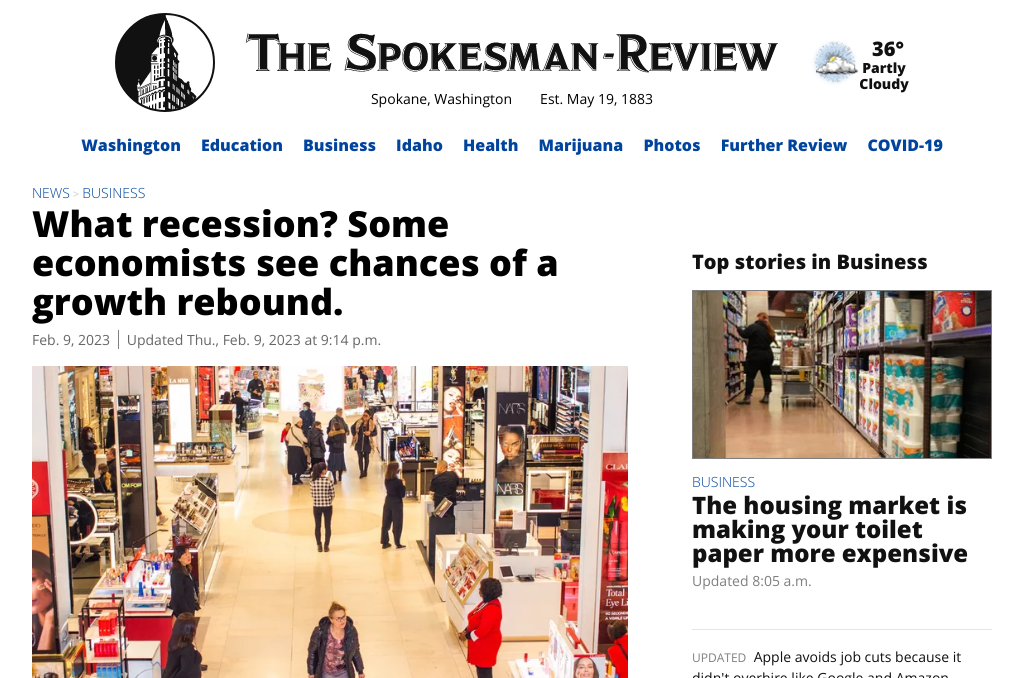The bond market is signaling that the US economy may not enter a recession anytime soon, according to a Monday note from DataTrek Research. This suggests that corporate bond-yield spreads relative to US Treasuries indicate that the economy is likely not to enter a recession in 2023 or 2024.
When the economy begins to decline, we usually refer to it as either a “hard” or “soft” landing – meaning that either a rapid decline with millions of jobs lost or a more gradual decrease in inflation could occur.[0] A new economic concept is now circulating.[1] This is referred to as a “rolling recession,” which is somewhat of a combination.[0] When one industry experiences a decline, then another follows suit, the overall economy remains steady and employment levels remain relatively stable.[1]
The Federal Reserve has lifted rates from near-zero early last year to above 4.5% as of last week – the fastest series of policy adjustment in decades.[2] The increased borrowing costs have caused car loans and mortgages to become more expensive, leading to a slow-down in economic activity.[3] That said, the spread between corporate bond yields and US Treasuries helps measure the risk appetite of bond traders. In periods where there is an increased likelihood of losses and investors demand greater compensation for assuming additional risk, the difference between yields will enlarge.[4]
The spread between corporate bond yields and US Treasuries is continuing to decline and is now slightly below the average seen from 2015 to 2019. This suggests that the corporate debt markets are not as worried about a sudden decline in corporate earnings as they were in a period of relative financial and economic stability.[5]
Veteran financial market analyst Ed Yardeni recalls using the phrase “rolling recession” in the mid-1980s, when a collapse in energy prices cut a swath through the oil patch and the repeal of an investment tax credit crippled commercial real estate.[0] The economy slowed yet stayed intact.[1]
Overall, it appears that the US economy may be able to avoid a recession this year, though the odds still favor a brief and mild downturn.[6] Despite this, the consensus is rarely correct and Federal Reserve officials still have to thread the needle in order to keep inflation from running away without quashing the economy.
0. “We Might Be in a ‘Rolling Recession’ — Here’s What It Means” Entrepreneur, 10 Feb. 2023, https://www.entrepreneur.com/business-news/we-might-be-in-a-rolling-recession-heres-what-it/444809
1. “If you have to have a recession, make it a rolling one” The Business Standard, 9 Feb. 2023, https://www.tbsnews.net/bloomberg-special/if-you-have-have-recession-make-it-rolling-one-582618
2. “Q&A: What’s up with the economy? Is recession still coming?” Los Angeles Times, 9 Feb. 2023, https://www.latimes.com/politics/story/2023-02-09/q-a-wheres-the-recession-and-is-it-still-coming
3. “What recession? Some economists see chances of a growth rebound.” The Spokesman Review, 9 Feb. 2023, https://www.spokesman.com/stories/2023/feb/09/what-recession-some-economists-see-chances-of-a-gr
4. “Here’s why the US economy won’t fall into a recession this year or next, according to a key market signal” Business Insider India, 7 Feb. 2023, https://www.businessinsider.in/stock-market/news/heres-why-the-us-economy-wont-fall-into-a-recession-this-year-or-next-according-to-a-key-market-signal/articleshow/97698876.cms
5. “The bond market is signaling that the US economy won’t enter a recession” Markets Insider, 6 Feb. 2023, https://markets.businessinsider.com/news/bonds/bond-market-signals-us-economy-recession-forecast-corporate-yield-spread-2023-2
6. “Why the Recession Consensus Might Be Too Optimistic” Elliott Wave International, 7 Feb. 2023, https://www.elliottwave.com/Economy/Why-the-Recession-Consensus-Might-Be-Too-Optimistic
